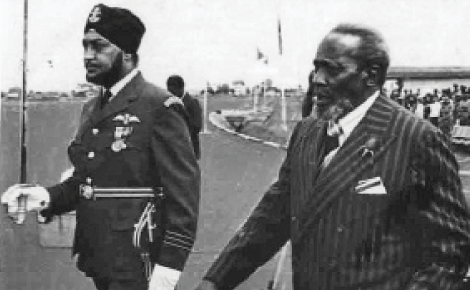 |
|
Gurcharan Singh Chana With founding President Jomo Kenyatta at Kenya Air Force headquaters, Eastleigh. [PHOTOS: JOE OMBUOR/FILE/STANDARD] |
By JOE OMBUOR
Kisumu, Kenya: When the Sikh community gathered in Kisumu recently to celebrate 100 years of the existence of the Siri Guru Sing Sabha Gurdwara (Sikh temple) in the lakeside city, the man tending to the musical instruments in the shrine was Captain Gurcharan Singh Chana, a former airline pilot.
Many of his fans were not surprised, having seen him perform not only in temples across the country, but in the company of renowned Indian Ghazal singer, the late Jagjit Singh, popularly referred to as the “Ghazal King” whom from time to time he accompanied for shows overseas.
So close was Chana to the Ghazal maestro who expired in October 2011 in Mumbai, India, that when the government of Prime Minister Manmohan Singh decided to release stamps bearing his image in his honour, Chana was recognised with several complimentary copies for his album.
Indelible achievement
A born musician who started playing the tabla (Indian percussion instrument) at the tender age of six, Chana first interacted with the legendary Jagjit Singh while at the Kenya Air Force (KAF) where he rose to the level of Station Commander.
“I was mesmerised by his stage performance, prompting me to invite him to the Air Force base for a performance. He did not disappoint and from then, our friendship grew and grew. Not only did I join him on stage whenever he was invited to perform locally, I would accompany him to other parts of the world when my busy schedule allowed,” reminisces Captain Chana.
Like music, Chana’s fascination with flying started early in life to his father’s chagrin.
“His determination to see my music talent flourish was such that he took me to India to play under the watch of Gurus for eight months. He would not hear of my ambition to fly because he believed that flying was synonymous with death,” he says.
“I got a job as a clerk with the National and Grindlays Bank (now Kenya Commercial Bank) after School Certificate and immediately started saving part of the Sh350 monthly salary to realise my dream of doing a flying course. My aim was to get a private pilot’s license,” he adds.
Chana says he paid dearly for his decision to defy his father’s wish and remembers a time he had to run away from home to escape his father’s wrath for trips to Wilson Airport.
He continues: “My father poured his fury on me with a severe beating when I returned after rumours went round that my disappearance was to be announced on the Voice of Kenya radio. It was the most brutal and last beating from my father. As fate would have it, he did not live long after that.”
President Jomo Kenyatta
“With my father’s death came my freedom to go to Wilson Airport for interviews after I submitted my application for training as a pilot. Royal Air Force instructors subjected me to flight checks after which I was recruited as a trainee officer cadet. I was later to proceed to England for further training at the Royal Air Force,” he says.
Chana recalls with pride how he was commissioned on his return to Kenya by President Jomo Kenyatta.
Stay informed. Subscribe to our newsletter
After two decades of a fulfilling career as a fighter pilot, squadron commander and station commander, during which he trained many Air Force pilots, Chana retired from KAF in 1985.
He had retrained pilots after the August 1982 attempted coup d’état and had a brief stint at the Department of Defence as the officer in charge of logistics.
He talks fondly of his days in the Air Force where he left indelible spoors as the first Sikh squadron and station commander.
Pride surging all over his bearded face, Chana recalls how he pulled off what he claims no other Sikh has ever done, leading the President in inspecting a guard of honour.
Flying experience
“That fete followed in the wake of yet another indelible achievement when I became the first Sikh to be elevated to the rank of Lieutenant Colonel at the Air Force,’’ says Chana.
He moved to Kenya Airways to “broaden” his flying experience, working as a commercial pilot for 24 years before he walked out of the cockpit to “concentrate on tabla music”.
Now retired and into tabla, his pet hobby full time, Chana boasts of having been to all kinds of cockpits, from meteoric jet fighters to the Fokkers and the Boeings.
He was flying Boeing 737 at Kenya Airways by the time he hung up his ‘wings’ for good.
Captain Chana is nostalgic about flying, that he admittedly misses a lot after he reached the mandatory age barrier of 65 years, but what truly warms up his pride are the many destinations he flew to as a commercial pilot with KQ and the sweet memory of his days as squadron and later, station commander at KAF.
The veteran pilot that he is, Captain Chana says he was baffled by the mystery surrounding the disappearance of Malaysian flight MH370 saying: “I never saw anything like it in all my 44 years as a pilot,” he says.
Greatest enemy
“It baffles me that the plane has eluded the attention of the entire world for days,” he says, concern etched all over his brow.
He pinpoints man-made problems as the most likely cause of the plane’s disappearance.
“Man-made problems can be anything from human error, terrorism to pilot suicide. But weather remains the greatest enemy to flying,” he says.
On how he managed to juggle his time between playing tabla and flying, a manifestly strange combination, he says casually: “Both require precision.”
 The Standard Group Plc is a
multi-media organization with investments in media platforms spanning newspaper
print operations, television, radio broadcasting, digital and online services. The
Standard Group is recognized as a leading multi-media house in Kenya with a key
influence in matters of national and international interest.
The Standard Group Plc is a
multi-media organization with investments in media platforms spanning newspaper
print operations, television, radio broadcasting, digital and online services. The
Standard Group is recognized as a leading multi-media house in Kenya with a key
influence in matters of national and international interest.
 The Standard Group Plc is a
multi-media organization with investments in media platforms spanning newspaper
print operations, television, radio broadcasting, digital and online services. The
Standard Group is recognized as a leading multi-media house in Kenya with a key
influence in matters of national and international interest.
The Standard Group Plc is a
multi-media organization with investments in media platforms spanning newspaper
print operations, television, radio broadcasting, digital and online services. The
Standard Group is recognized as a leading multi-media house in Kenya with a key
influence in matters of national and international interest.






